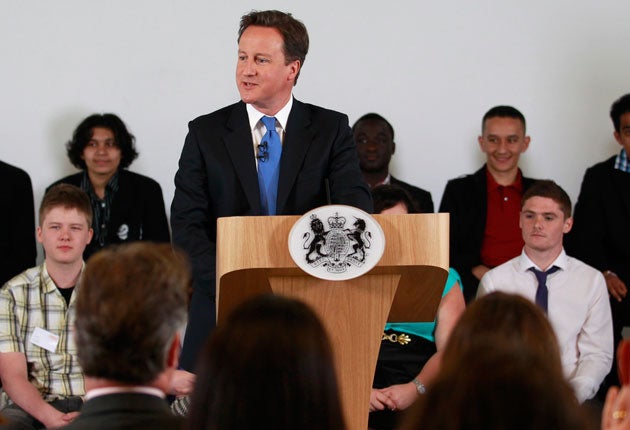Leaders differ in their visions for the family

Your support helps us to tell the story
From reproductive rights to climate change to Big Tech, The Independent is on the ground when the story is developing. Whether it's investigating the financials of Elon Musk's pro-Trump PAC or producing our latest documentary, 'The A Word', which shines a light on the American women fighting for reproductive rights, we know how important it is to parse out the facts from the messaging.
At such a critical moment in US history, we need reporters on the ground. Your donation allows us to keep sending journalists to speak to both sides of the story.
The Independent is trusted by Americans across the entire political spectrum. And unlike many other quality news outlets, we choose not to lock Americans out of our reporting and analysis with paywalls. We believe quality journalism should be available to everyone, paid for by those who can afford it.
Your support makes all the difference.David Cameron and Ed Miliband set out contrasting visions yesterday of how to bolster family life and rebuild a sense of community in Britain in the wake of the budget squeeze on public spending.
The Prime Minister announced plans to increase charitable giving and volunteering as he sought to breathe new life into his struggling "Big Society" agenda. The Labour leader, meanwhile, said he wanted to be judged in office by his success in boosting the job opportunities and supply of affordable housing for young adults.
Mr Cameron promised an extra £42m in help for the voluntary sector in an attempt to encourage people to spend more time and money on good causes. The ambition of fostering a "Big Society" has been a constant theme for the Prime Minister, who has repeatedly returned to it in the face of colleagues' scepticism and public indifference.
Speaking yesterday in Milton Keynes, he insisted that it was fundamental to his determination to improve the quality of life in Britain over the next decade.
"As our debts are paid off, this is what I want to endure as the lasting legacy of this administration – helping to build a society where families and communities are stronger, where our nation's wellbeing is higher, and where all these things are accepted as central, not peripheral aspects of what modern governments should hope to achieve," he said.
"So the Big Society is not some fluffy add-on to more gritty and more important subjects. This is about as gritty and important as it gets: giving everyone the chance to get on in life and making our country a better place to live."
Ministers have been encouraged by the announcement that the Link network of cash machines has agreed that from next year members of the public will be able to donate to charity at the same time as drawing out money. They are also now working on measures to boost voluntary organisations and to link wealthy donors to charities.
Mr Miliband, speaking in London, warned that Britain faced a "jilted generation" of young adults with fewer opportunities than their parents. He insisted: "We must reverse the sense of foreboding that people feel for their children and their future."
The Labour leader said: "David Cameron's benchmark for his government is simply deficit reduction. The benchmark I set for a future Labour government is much more than that. It is about improving the chances for the next generation."
He called for a drive to find jobs for young people, improve conditions in the workplace, guarantee "genuine access" to university for aspiring students, halt the "inexorable rise in the average age of home ownership" and tackle climate change.
Mr Miliband said the overwhelming majority of young people were decent and wanted to do the best for their families and communities.
"We owe it to them to paint a fairer picture of young people in our country and to celebrate what they do," he said. "But it is a two-way street. The promise of Britain is not just about the promise we make to them, but the promise they must make to themselves and our country to be good citizens."
Earlier, Mr Miliband, who will marry his long-term partner Justine Thornton on Friday, insisted that marriage was not always in families' interests. He told the BBC: "I am pro-commitment, but I think that unlike David Cameron, I am not going to say that those families that aren't married are automatically less stable than those families that are. Marriage is a good institution, it is right for me and Justine, but the thing that really matters to people is stable families and they come in different forms."
Join our commenting forum
Join thought-provoking conversations, follow other Independent readers and see their replies
Comments